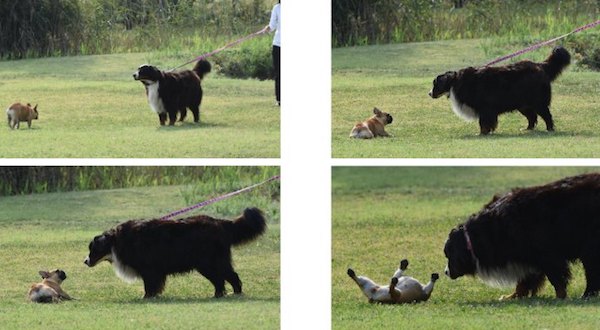The belly-up posture, with the dog standing still (not rolling over), is described as passive submission.
Ethologist Rudolph Shenkel* writes: "It expresses some kind of timidity and helplessness. It occours when the inferior is strongly impressed by the partner's superiority."
"From the point of view of motivation we may define submission as an impulse and effort of the inferior towards friendly and harmonic social integration." *Submission: Its features and function in the Wolf and Dog - 1967
During play, however, it may be the stronger dog that goes belly-up, a behaviour defined as self-handicap:
"The stronger partner displays behaviour that puts it at a disadvantage during play".

During my observations and research on the dog's ethogram, I have observed dogs displaying this behaviour to defuse a potential conflict.

Sonne (French bulldog f.) offers the belly-up to an unrelated male Bernese mountain dog.
On a rare occasions I have observed this behaviour being used to divide two dogs in conflict
Sonne split them up like this:

The Border Collie puppy (right) showed stressful and fearful behaviour towards the Tamaskan puppy (left).
- It takes a lot of self-confidence, and a lot of trust in others, to get into a belly-up posture!!!
- We should never force a dog into this posture using physical coercion, intimidation, or violence, thus betraying its trust and its need for safety and connection.

Text Alexa Capra 28 june 2022
Photo Alexa Capra




